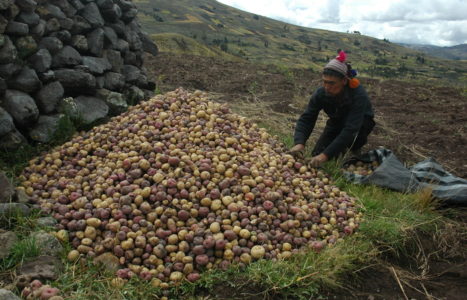Researchers believe measuring extreme results of global warming in the Andes is key to understanding how to cope with climate change worldwide.
Wednesday, October 16, 2019, Des Moines, IOWA – Researchers based in Lima, Peru, today launched a bid to shine a light on climate change in the Andes Mountains to better understand how to adapt to a warming world.
Home to many indigenous superfoods from grains like amaranth and quinoa to lupine pulses and maca roots, the Andes is described as the “richest hotspot of agrobiodiversity” in the world.
Mountain regions also play a critical role in downstream water supplies, with the Andes providing as much as 50 per cent of the water for the upstream Amazon’s river basins through glacial melt.
Yet changing temperatures and weather patterns have resulted in extreme droughts, hailstorms and frost, which is impacting food production and agriculture at altitude in the Andes and beyond.
“The Andes is one of the last rich hotspot of agrobiodiversity, and the birthplace of many nutritional crop varieties that are vital for meeting the global need for a diverse diet,” said Ginya Truitt Nakata, director of Latin America and the Caribbean at the International Potato Center (CIP), which launched the initiative at this year’s World Food Prize event.
“All of this makes the Andes a petri dish for climate change, and we overlook its importance at our own peril.”
The initiative to accelerate climate research in the Andes will focus on agrobiodiversity, climate change and healthy diets, and will include a new network of laboratories to study extreme frosts, hailstorms, excess rain and droughts.
Researchers will also develop a tool for assessing changes in land use, and support farmers with new markets for superfoods.

One understudied area of climate research to be addressed is the significance of high-altitude below-ground carbon stocks, and the risks associated with unsustainable land use in the Andes.
“The volume of carbon stocks per area unit in peatlands in the High Andes are comparable to those in the Amazon, yet the role of the Andes as a carbon reservoir has received little attention from researchers and policymakers while there is increase evidence that land use change rapidly driving the agricultural frontier upwards” said Stef De Haan, senior scientist at CIP.
“By dedicating climate research to this vital region, we stand the chance of being able to protect indigenous families, rural incomes and nutritious diets while also adapting and mitigating the effects of climate change.”
CIP already spearheads several projects to protect biodiversity in the Andean region, including in-situ conservation with smallholder farmers and repatriation programs returning lost agrobiodiversity to indigenous communities.
CIP researchers also work with communities to improve diets using improved indigenous crops.
“Through our strategic partnership and collaboration, we will support and progress vital work in the Andean region, which is experiencing the impacts of climate change with a greater intensity than anywhere else in the world,” said Jesus Quintana, Head of the Andean and Southern Cone Sub-regional Hub at the International Fund for Agricultural Development (IFAD), one of the co-hosts of the World Food Prize side event.
“This living laboratory of climate science and agrobiodiversity can offer valuable lessons for tropical mountain regions and vulnerable areas worldwide for climate resilience.”
About
The International Potato Center (CIP) was founded in 1971 as a research-for-development organization with a focus on potato, sweetpotato and Andean roots and tubers. It delivers innovative science-based solutions to enhance access to affordable nutritious food, foster inclusive sustainable business and employment growth, and drive the climate resilience of root and tuber agri-food systems. Headquartered in Lima, Peru, CIP has a research presence in more than 20 countries in Africa, Asia and Latin America.
CIP is a CGIAR research center, a global research partnership for a food-secure future. CGIAR science is dedicated to reducing poverty, enhancing food and nutrition security, and improving natural resources and ecosystem services. Its research is carried out by 15 CGIAR centers in close collaboration with hundreds of partners, including national and regional research institutes, civil society organizations, academia, development organizations and the private sector.
Contact
Donna Bowater
Marchmont Communications
donna@marchmontcomms.com
+44 7929 212 534
